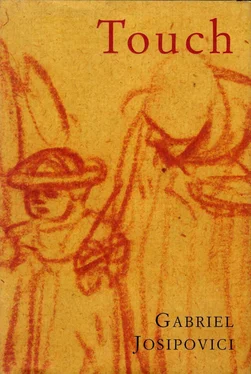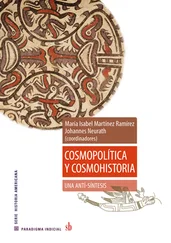Gabriel Josipovici - Touch
Здесь есть возможность читать онлайн «Gabriel Josipovici - Touch» весь текст электронной книги совершенно бесплатно (целиком полную версию без сокращений). В некоторых случаях можно слушать аудио, скачать через торрент в формате fb2 и присутствует краткое содержание. Год выпуска: 1996, ISBN: 1996, Издательство: Yale University Press, Жанр: Современная проза, на английском языке. Описание произведения, (предисловие) а так же отзывы посетителей доступны на портале библиотеки ЛибКат.
- Название:Touch
- Автор:
- Издательство:Yale University Press
- Жанр:
- Год:1996
- ISBN:0300066902
- Рейтинг книги:5 / 5. Голосов: 1
-
Избранное:Добавить в избранное
- Отзывы:
-
Ваша оценка:
- 100
- 1
- 2
- 3
- 4
- 5
Touch: краткое содержание, описание и аннотация
Предлагаем к чтению аннотацию, описание, краткое содержание или предисловие (зависит от того, что написал сам автор книги «Touch»). Если вы не нашли необходимую информацию о книге — напишите в комментариях, мы постараемся отыскать её.
Touch — читать онлайн бесплатно полную книгу (весь текст) целиком
Ниже представлен текст книги, разбитый по страницам. Система сохранения места последней прочитанной страницы, позволяет с удобством читать онлайн бесплатно книгу «Touch», без необходимости каждый раз заново искать на чём Вы остановились. Поставьте закладку, и сможете в любой момент перейти на страницу, на которой закончили чтение.
Интервал:
Закладка:
Proust sets up the scene as though it were a film, for the watcher sits in the shadows, unseen and safe, while the dramatic events pass in a lighted square before his eyes.
Marcel has strolled to the precincts of the house owned by the composer Vinteuil, who has recently died, and has lain down on a grassy bank. It is a hot day and he has gone to sleep. He wakes up to find that it is almost night. At an open window, practically on a level with him and barely a few feet away, he sees the composer's daughter. She has obviously just come in. She is in mourning for her father. On the mantelpiece is a portrait of him and, as Marcel watches, she goes over to fetch it. At this moment a carriage is heard coming up the drive and soon Mlle Vinteuil's friend joins her. She moves to close the shutters. Her friend stops her. But someone may see us, she says. Here in the middle of the country? laughs the friend, and then adds: What if they do? All the better that they should see us.
So the window is left open and Marcel goes on watching. The two women chase each other round the room, then collapse laughing on the sofa. They embrace. Mlle Vinteuil says something about wanting to remove the portrait of her father from their vicinity, but her friend abruptly stops her: ‘Let him stay there. He can't bother us any longer. D'you think he'd start whining, and wanting to put your overcoat on for you, if he saw you now with the window open, the ugly old monkey?’
They embrace again and then the friend takes the portrait in her hands and looks at it. ‘Do you know what I should like to do to this old horror?’ she asks, and whispers something to Mlle Vinteuil. ‘Oh! You wouldn't dare.’ ‘Not dare to spit on it? On that ?’ asks the friend, with, Proust says, ‘studied brutality’. Marcel, however, sees no more, for Mlle Vinteuil, ‘with an air that was at once languid, awkward, bustling, honest and sad’, does then get up and close the shutters. But, he adds, he now knows that, for all the sufferings his daughter had brought her father during his lifetime, there would be worse to follow for Vinteuil after his death. And yet, he says, with one of those typically Proustian additions which make one realise that genius is in effect nothing more than the ability to push an insight to its limits and not be deflected either by laziness or by conventional wisdom,
I have since reflected that if M. Vinteuil had been able to be present at this scene, he might still, in spite of everything, have continued to believe in his daughter's goodness of heart, and perhaps in doing so he would not have been altogether wrong. It was true that in Mlle Vinteuil's habits the appearance of evil was so absolute that it would have been hard to find it exhibited to such a degree of perfection outside a convinced sadist; it is behind the footlights of a Paris theatre and not under the homely lamp of an actual country house that one expects to see a girl encouraging a friend to spit upon the portrait of a father who has lived and died for her alone; and when we find in real life a desire for melodramatic effect, it is generally sadism that is responsible for it.
And yet, he goes on,
It is possible that, without being in the least inclined towards sadism, a daughter might be guilty of equally cruel offences as those of Mlle Vinteuil against the memory and the wishes of her dead father, but she would not give them deliberate expression in an act so crude in its symbolism, so lacking in subtlety; the criminal element in her behaviour would be less evident to other people, and even to herself, since she would not admit to herself that she was doing wrong.
And now, in a passage of great subtlety and profundity, Proust concludes:
Sadists of Mlle Vinteuil's sort are creatures so purely sentimental, so naturally virtuous, that even sensual pleasure appears to them as something bad, the prerogative of the wicked. And when they allow themselves for a moment to enjoy it they endeavour to impersonate, to identify with, the wicked, and to make their partners do likewise, in order to gain a momentary illusion of having escaped beyond the control of their own gentle and scrupulous natures into the inhuman world of pleasure. And I could understand how she must have longed for such an escape when I saw how impossible it was for her to effect it.
‘Perhaps’, ends Proust,
she would not have thought of evil as a state so rare, so abnormal, so exotic, one in which it was so refreshing to sojourn, had she been able to discern in herself, as in everyone else, that indifference to the sufferings one causes which, whatever other names one gives it, is the most terrible and lasting form of cruelty.
Indifference, not sadism, is the cardinal sin. Indifference implies a lack of imagination, an inability to feel what it is like to be another, and the result is cruelty, epitomised in the novel by the Duchesse de Guermantes' refusal to listen to Swann telling her he is mortally ill because to respond to that would mean the ruin of her evening out. We have all, at one time or another, acted like the duchess; what is hard for us to accept is that such actions place one in Hell no less than the deliberate treatment of others as vermin. For Hell has many circles and there is no essential distinction between the adoring Francesca clinging to her Paolo and the cannibal Ugolino gnawing at the skull of his enemy, between the duchess's refusal to hear what Swann is telling her and Gregor Samsa's family not wanting to accept that it is their son who has turned into a revolting insect.
Reading Proust, walking round museums and art galleries, listening to Beethoven, will not necessarily save us from such a fate. It may indeed be that such activities only reinforce our indifference (‘In the room the women come and go,/Talking of Michelangelo’). Sadism, on the other hand, at least in the form practised by Mlle Vinteuil, like the masturbation explored a few pages earlier, represents a striving to escape the solitary confinement of indifference, a wild strategy to force an apparently indifferent world to touch us, if only for a moment. Unfortunately it can never truly succeed, for it is always we who instigate it and what we need is precisely the opposite: it is for the world to touch us, unawares. Thus it has to be repeated, over and over again, in ever more desperate and ineffectual efforts. But then how are we to act once we have fallen into the solitude of our lives, once the aura which had lit up the world and which we had, until one fateful moment, taken for granted, seems to have been lost for ever? Are we to wait, like Chaplin's flower-girl, for that miracle which may never happen? Or is there some other way in which we can help it into being, a less melancholy, less desperate way?
8 The Lesson of the Hand (2)
Colonus is said to have been Sophocles' birthplace, so that in Oedipus at Colonus , written when he was past eighty, the playwright is, among other things, celebrating the place where he was born. But at the same time he is celebrating the place which had been the central focus of his life, the Dionysian stage. Like Chaplin in City Lights he chose a blind protagonist, but he did so not to provide laughter or to jerk the tears of his audience, but to lead them to an exploration of the relations between those who watch a spectacle and the hero of that spectacle, between clinging and letting go, between the human body and the space it inhabits.
The aged Oedipus, who had blinded himself on learning that he had killed his father and begotten children on his own mother, has been cast out of Thebes and has arrived here, where we first see him, led by his devoted daughters, Antigone and Ismene. His first words put the theme of place squarely before us:
Tell me, Antigone — where have you come to now
Читать дальшеИнтервал:
Закладка:
Похожие книги на «Touch»
Представляем Вашему вниманию похожие книги на «Touch» списком для выбора. Мы отобрали схожую по названию и смыслу литературу в надежде предоставить читателям больше вариантов отыскать новые, интересные, ещё непрочитанные произведения.
Обсуждение, отзывы о книге «Touch» и просто собственные мнения читателей. Оставьте ваши комментарии, напишите, что Вы думаете о произведении, его смысле или главных героях. Укажите что конкретно понравилось, а что нет, и почему Вы так считаете.












